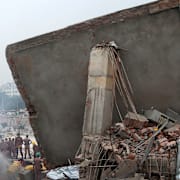
The collapsed Rana Plaza factory complex in 2013. Wong Maye-E / Ap
Analysis: Economic reasons why fashion companies take shortcuts
The problems of poor working conditions in the garment industry are still many and risk leading to the death of workers. This
is what professor Ravi Anupindi, an expert on supply chains, writes in
an analysis in The Conversation on the occasion of ten years since the
Rana Plaza disaster.
Strong economic forces are behind the location of production in low-wage countries. On a shirt that costs 30 dollars, the fashion giants usually have a margin of 60 percent. The factory's profit on each such shirt is $1.15 of which 18 cents goes to the worker.
The jobs have certainly led to reduced poverty in the countries concerned and improved conditions for women in particular. But there are also several negative effects, according to Anupindi.
"A
highly competitive environment, where everyone in the supply chain is
looking for the lowest price [...] creates incentives to take
shortcuts."

Woman searches for her sister after the Rana Plaza tragedy. File photo from 2013. Wong Maye-E / Ap
Ten years after factory tragedy: EU legislation not ready
Ten
years have passed since more than 1,100 people died when the Rana Plaza
factory building in Bangladesh's capital Dhaka collapsed. Clothes for European fashion giants such as Prada, Gucci and Benetton were sewn in the building.
The
incident led to the companies being heavily criticized for turning a
blind eye to poor working conditions and a lack of oversight in their
supply chains. At EU level, legislation has been pushed and shoved for years. The hope is that it will be in place by 2024, writes Politico.
A source within the EU that the site has spoken to says that legislation will not be enough. The companies need to be persuaded to change their approach and not put production where it is cheapest.
Inga kommentarer:
Skicka en kommentar